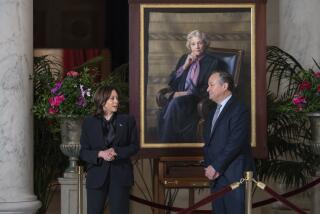Ben C. Duniway, Senior Judge of U.S. 9th Circuit Court, Dies at 78
- Share via
Ben Cushing Duniway of San Francisco, a senior judge of the U.S. 9th Circuit Court of Appeals who favored splitting the nation’s largest appellate court into smaller jurisdictions, has died at the age of 78.
Duniway, who died at Stanford University Hospital on Saturday of a heart condition, was one of two Democratic appointees to the 9th Circuit by President John F. Kennedy in 1961, when the court had nine active judges instead of the present 28.
While he continued to work on major cases in his later years on the court, Duniway declined to hear many routine matters and frequently commented that the court had become too clogged with cases and too unwieldy in size to be effective.
Appeals Without Merit
“There were 450 appeals filed the year I joined the court,” Duniway told The Times in a 1984 interview. “Now there are over 4,000 a year, and a lot of appeals don’t have any merit to them.
“The court is beginning to function more like a bureau than a court. Judges today can’t give the attention to a case that I was able to do 25 years ago. I can sit as much as I choose and I don’t choose to sit a hell of a lot.”
Duniway, a descendant of a family that arrived in California in 1849, was born at Stanford, where his father was a history professor. He later graduated from Carleton College in Minnesota and received his law degree from Stanford.
Antitrust Work
Before his appointment to the 9th Circuit, he was an antitrust lawyer with the San Francisco firm of Cushing & Cushing, head of President Harry S. Truman’s San Francisco presidential campaign in 1948 and a judge of the First District of the California Court of Appeal for two years.
He was one of only two San Francisco lawyers on the 28-judge 9th Circuit, which is headquartered in San Francisco but covers all of California and eight other Western states.
Chief 9th Circuit Judge James R. Browning of San Francisco, the only other Kennedy appointee on the court, said Duniway had remained active in “many of our most difficult cases in recent years.”
“He was a very distinguished judge and I remember him for the quality of his written opinions,” Browning said. “He was the only person I ever met who read the New Yorker from cover to cover because he liked the writing.”
Duniway’s wife, Ruth Mason, died last year. He is survived by two daughters, a son, a brother, and eight grandchildren.
Donations may be made to the Judge Ben. C. Duniway Fund at the Stanford Law School or to Carleton College, Northfield, Minn.
More to Read
Sign up for Essential California
The most important California stories and recommendations in your inbox every morning.
You may occasionally receive promotional content from the Los Angeles Times.













